Ways to manage
■ Try to sleep at least 8 hours each night. This may be more sleep than you needed before radiation therapy. One way to sleep better at night is to be active during the day. For example, you could go for walks, do yoga, or ride a bike. Another way to sleep better at night is to relax before going to bed. You might read a book, work on a jigsaw puzzle, listen to music, or do other calming hobbies.
26
1-800-4-CANCER (1-800-422-6237)
■ Plan time to rest. You may need to nap during the day. Many people say that it helps to rest for just 10 to 15 minutes. If you do nap, try to sleep for less than 1 hour at a time.
■ Try not to do too much. With fatigue, you may not have enough energy to do all the things you want to do. Stay active, but choose the activities that are most important to you. For example, you might go to work but not do housework, or watch your children’s sports events but not go out to dinner.
■ Exercise. Most people feel better when they get some exercise each day. Go for a 15- to 30-minute walk or do stretches or yoga. Talk with your doctor or nurse about how much exercise you can do while having radiation therapy.
■ Plan a work schedule that is right for you. Fatigue may affect the amount of energy you have for your job. You may feel well enough to work your full schedule, or you may need to work
less—maybe just a few hours a day or a few days each week. You may want to talk with your boss about ways to work from home
so you do not have to commute. And you may want to think
about going on medical leave while you have radiation therapy.
■ Plan a radiation therapy schedule that makes sense for you. You may want to schedule your radiation therapy around your work or family schedule. For example, you might want to have radiation therapy in the morning so you can go to work in the afternoon.
■ Let others help you at home. Check with your insurance company to see whether it covers home care services. You can also ask family members and friends to help when you feel fatigue. Home care staff, family members, and friends can assist with household chores, running errands, or driving you to and from radiation therapy visits. They might also help by cooking meals for you to eat now or freeze for later.
■ Learn from others who have cancer. People who have cancer can help each other by sharing ways to manage fatigue. One way to meet other people with cancer is by joining a support group—either in person or online. Talk with your doctor or nurse to learn more about support groups.
■ Talk with your doctor or nurse. If you have trouble dealing with fatigue, your doctor may prescribe medicine (called psychostimulants) that can help decrease fatigue, give you a sense of well-being, and increase your appetite. Your doctor may also suggest treatments if you have anemia, depression, or are not able to sleep at night.
www.cancer.gov
27

Radiation Therapy Side Effects and Ways to Manage Them
Hair Loss
What it is
You will lose hair only
Hair loss (also called alopecia) is when some or all
of your hair fal s out.
on the part of your
body being treated.
Why it occurs
Radiation therapy can cause hair loss because it damages cel s that grow quickly, such as those in your hair roots.
Hair loss from radiation therapy only happens on the part of your body being treated. This is not the same as hair loss from chemotherapy, which happens all over your body. For instance, you may lose some or all of the hair on your head when you get radiation to your brain. But if you get radiation to your hip, you may lose pubic hair (between your legs) but not the hair on your head.
How long it lasts
You may start losing hair in your treatment area 2 to 3 weeks after your first radiation therapy session. It takes about a week for all the hair in your treatment area to fall out. Your hair may grow back 3 to 6 months after treatment is over. Sometimes, though, the dose of radiation is so high that your hair never grows back.
Once your hair starts to grow back, it may not look or feel the way it did before. Your hair may be thinner, or curly instead of straight. Or it may be darker or lighter in color than it was before.
Ways to manage hair loss on your head
Before hair loss:
■ Decide whether to cut your hair or shave your head. You may feel more in control of hair loss when you plan ahead. Use an electric razor to prevent nicking yourself if you decide to shave your head.
28
1-800-4-CANCER (1-800-422-6237)
■ If you plan to buy a wig, do so while you still have
hair. The best time to select your wig is before radiation therapy begins or soon after it starts. This way, the wig
will match the color and style of your own hair. Some
people take their wig to their hair stylist. You will want
to have your wig fitted once you have lost your hair.
Make sure to choose a wig that feels comfortable and
does not hurt your scalp.
■ Check with your health insurance company to see whether it will pay for your wig. If it does not, you can deduct the cost of your wig as a medical expense on your income taxes. Some groups also sponsor free wig banks. Ask your doctor, nurse, or social worker if he or she can refer you to a free wig bank in your area.
■ Be gentle when you wash your hair. Use a mild shampoo, such as a baby shampoo.
Dry your hair by patting (not rubbing) it with a soft towel.
■ Do not use curling irons, electric hair dryers, curlers, hair bands, clips, or hair sprays. These can hurt your scalp or cause early hair loss.
■ Do not use products that are harsh on your hair. These include hair colors, perms, gels, mousse, oil, grease, or pomade.
After hair loss:
■ Protect your scalp. Your scalp may feel tender after hair loss. Cover your head with a hat, turban, or scarf when you are outside. Try not to be in places where the temperature is very cold or very hot. This means staying away from the direct sun, sun lamps, and very cold air.
■ Stay warm. Your hair helps keep you warm, so you may feel colder once you lose it. You can stay warmer by wearing a hat, turban, scarf, or wig.
Ways to learn more
American Cancer Society
Offers a variety of services to people with cancer and their families, including referrals to low-cost wig banks.
Toll-free:
1-800-ACS-2345 (1-800-227-2345)
Phone:
404-320-3333
Online:
http://www.cancer.org
www.cancer.gov
29

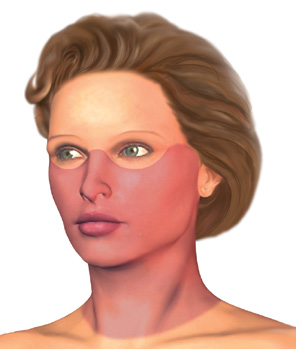
Radiation Therapy Side Effects and Ways to Manage Them
Mouth Changes
What they are
Radiation therapy to the head or neck can cause problems such as:
■ Mouth sores (little cuts or ulcers in your mouth)
■ Dry mouth (also called xerostomia) and throat
■ Loss of taste
■ Tooth decay
■ Changes in taste (such as a metallic taste when you
eat meat)
■ Infections of your gums, teeth, or tongue
■ Jaw stiffness and bone changes
Radiation to the shaded area may
cause mouth changes.
■ Thick, rope-like saliva
Why they occur
Radiation therapy kil s cancer cel s and can also damage healthy cel s such as those in the glands that make saliva and the soft, moist lining of your mouth.
How long they last
Some problems, like mouth sores, may go away after treatment ends. Others, such as taste changes, may last for months or even years. Some problems, like dry mouth, may never go away.
Visit a dentist at least 2 weeks
before starting radiation
therapy to your head or neck.
30
1-800-4-CANCER (1-800-422-6237)
Ways to manage
■ If you are getting radiation therapy to your head or neck, visit a dentist at least 2
weeks before treatment starts. At this time, your dentist will examine your teeth and mouth and do any needed dental work to make sure your mouth is as healthy as possible before radiation therapy. If you cannot get to the dentist before treatment starts, ask your doctor if you should schedule a visit soon after treatment begins.
■ Check your mouth every day. This way, you can see or feel problems as soon as they start. Problems can include mouth
sores, white patches, or infection.
■ Keep your mouth moist. You can do this by:
• Sipping water often during the day
• Sucking on ice chips
• Chewing sugar-free gum or sucking on sugar-free hard candy
• Using a saliva substitute to help moisten your mouth
• Asking your doctor to prescribe medicine that helps
increase saliva
■ Clean your mouth, teeth, gums, and tongue.
• Brush your teeth, gums, and tongue after every meal and
at bedtime.
• Use an extra-soft toothbrush. You can make the bristles softer by running warm water over them just before you brush.
• Use a fluoride toothpaste.
• Use a special fluoride gel that your dentist can prescribe.
• Do not use mouthwashes that contain alcohol.
• Gently floss your teeth every day. If your gums bleed or hurt, avoid those areas but floss your other teeth.
• Rinse your mouth every 1 to 2 hours with a solution of 1/4
teaspoon baking soda and 1/8 teaspoon salt mixed in 1 cup of
warm water.
• If you have dentures, make sure they fit well and limit how long you wear them each day. If you lose weight, your dentist may need to adjust them.
• Keep your dentures clean by soaking or brushing them
each day.
www.cancer.gov
31

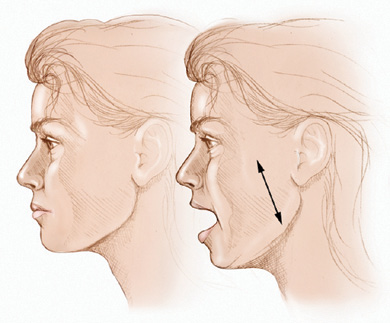
■ Be careful what you eat when your mouth is sore.
• Choose foods that are easy to chew and swallow.
• Take small bites, chew slowly, and sip liquids with your meals.
• Eat moist, soft foods such as cooked cereals, mashed potatoes, and scrambled eggs.
• Wet and soften food with gravy, sauce, broth, yogurt, or other liquids.
• Eat foods that are warm or at room temperature.
■ Stay away from things that can hurt, scrape, or burn your mouth, such as:
• Sharp, crunchy foods such as potato or corn chips
• Hot foods
• Spicy foods such as hot sauce, curry dishes, salsa, and chili
• Fruits and juices that are high in acid such as tomatoes, oranges, lemons, and grapefruits
• Toothpicks or other
sharp objects
Do not use tobacco or drink alcohol
• All tobacco products,
while you are getting radiation
including cigarettes, pipes,
therapy to your head or neck.
cigars, and chewing tobacco
• Drinks that contain alcohol
■ Stay away from foods and drinks that are high in sugar. Foods and drinks that have a lot sugar (such as regular soda, gum, and candy) can cause tooth decay.
■ Exercise your jaw muscles.
Open and close your mouth 20 times as
far as you can without causing pain.
Do this exercise 3 times a day, even if
your jaw isn’t stiff.
Exercise your jaw 3 times a day.
32
1-800-4-CANCER (1-800-422-6237)
■ Medicine. Ask your doctor or nurse about medicines that can protect your saliva glands and the moist tissues that line your mouth.
■ Call your doctor or nurse when your mouth hurts. There are medicines and other products, such as mouth gels, that can help control mouth pain.
■ You will need to take extra good care of your mouth for the rest of your life. Ask your dentist how often you will need dental check-ups and how best to take care of your teeth and mouth after radiation therapy is over.
Ways to learn more
National Oral Health Information Clearinghouse
A service of the National Institute of Dental and Craniofacial Research that provides oral health information for special care patients.
Phone:
301-402-7364
Online:
http://www.nidcr.nih.gov
Smokefree.gov
Provides resources, including information on quit lines, a step-by-step cessation guide, and publications, to help you or someone you care about quit smoking.
Toll-free:
1-877-44U-QUIT (1-877-448-7848)
Online:
http://www.smokefree.gov
www.cancer.gov
33
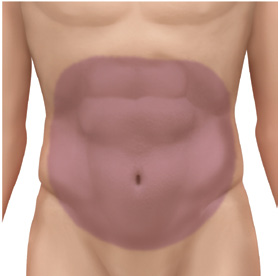
Radiation Therapy Side Effects and Ways to Manage Them
Nausea and Vomiting
What they are
Radiation therapy can cause nausea, vomiting, or both.
Nausea is when you feel sick to your stomach and feel like
you are going to throw up. Vomiting is when you throw
up food and fluids. You may also have dry heaves, which happen when your body tries to vomit even though your
stomach is empty.
Why they occur
Radiation to the shaded area may
cause nausea and vomiting.
Nausea and vomiting can occur after radiation therapy to
the stomach, small intestine, colon, or parts of the brain.
Your risk for nausea and vomiting depends on how much radiation you are getting, how much of your body is in the treatment area, and whether you are also having chemotherapy.
How long they last
Nausea and vomiting may occur 30 minutes to many hours after your radiation therapy session ends. You are likely to feel better on days that you do not have radiation therapy.
Ways to manage
■ Prevent nausea. The best way to keep from vomiting is to prevent nausea. One way to do this is by having bland, easy-to-digest foods and drinks that do not upset your stomach. These include toast, gelatin, and apple juice. To learn more, see the list of foods and drinks that are easy on the stomach on page 55.
■ Try to relax before treatment. You may feel less nausea if you relax before each radiation therapy treatment. You
can do this by spending time doing activities you enjoy,
such as reading a book, listening to music, or other
hobbies.
34
1-800-4-CANCER (1-800-422-6237)

■ Plan when to eat and drink. Some people feel better when they eat before radiation therapy; others do not. Learn the best time for you to eat and drink. For example, you might want a snack of crackers and apple juice 1 to 2 hours before radiation therapy.
Or, you might feel better if you have treatment on an empty stomach, which means not eating 2 to 3 hours before treatment.
■ Eat small meals and snacks. Instead of
eating 3 large meals each day, you may want
Eat 5 or 6 small meals
to eat 5 or 6 small meals and snacks. Make
and snacks each day
sure to eat slowly and do not rush.
instead of 3 large meals.
■ Have foods and drinks that are warm or
cool (not hot or cold). Before eating or
drinking, let hot food and drinks cool down and cold food and drinks warm up.
■ Talk with your doctor or nurse. He or she may suggest a special diet of foods to eat or prescribe medicine to help
prevent nausea, which you can take 1 hour before each
radiation therapy session. You might also ask your doctor
or nurse about acupuncture, which may help relieve
nausea and vomiting caused by cancer treatment.
To learn more about dealing with nausea and vomiting during cancer treatment, see Eating Hints: Before, During, and After Cancer Treatment, a book from the National Cancer Institute. You can get a free copy at http://www.cancer.gov/publications or 1-800-4-CANCER (1-800-422-6237).
www.cancer.gov
35

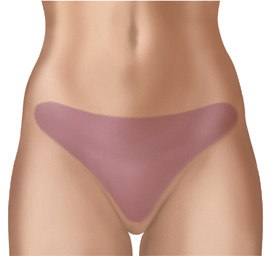
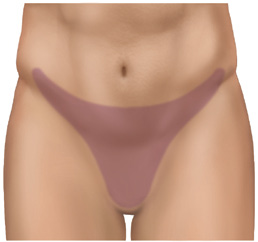
Radiation Therapy Side Effects and Ways to Manage Them
Sexual and Fertility Changes
What they are
Radiation therapy sometimes causes sexual changes, which can include hormone changes and loss of interest in or ability to have sex. It can also affect fertility during and after radiation therapy. For a woman, this means that she might not be able to get pregnant and have a baby. For a man, this means that he might not be able to get a woman pregnant.
Sexual and fertility changes differ for men and women.
Be sure to tell your doctor if you are pregnant
before you start radiation therapy.
Problems for women include:
■ Pain or discomfort when having sex
■ Vaginal itching, burning, dryness, or atrophy (when the
muscles in the vagina become weak and the wal s of the
vagina become thin)
■ Vaginal stenosis, when the vagina becomes less elastic, narrows, and gets shorter
■ Symptoms of menopause for women not yet in
menopause. These include hot flashes, vaginal dryness,
Radiation to the shaded area
and not having your period.
may cause sexual and fertility
changes.
■ Not being able to get pregnant after radiation therapy
is over
Problems for men include:
■ Impotence (also called erectile dysfunction or ED), which means not being able to have or keep an erection
■ Not being able to get a woman pregnant after radiation
therapy is over due to fewer or less effective sperm
36
1-800-4-CANCER (1-800-422-6237)

Why they occur
Sexual and fertility changes can happen when people get radiation therapy to the pelvic area. For women, this includes radiation to the vagina, uterus, or ovaries. For men, this includes radiation to the testicles or prostate. Many sexual side effects are caused by scar tissue from radiation therapy. Other problems, such as fatigue, pain, anxiety, or depression, can affect your interest in having sex.
How long they last
After radiation therapy is over, most people want to have sex as much as they did before treatment. Many sexual side effects go away after treatment ends. But you may have problems with hormone changes and fertility for the rest of your life. If you are able to get pregnant or father a child after you have finished radiation therapy, it should not affect the health of the baby.
Ways to manage
For both men and women, it is important to be open and honest with your spouse or partner about your feelings,
concerns, and how you prefer to be intimate while you are
getting radiation therapy.
For women, here are some issues to discuss with your doctor or nurse:
■ Fertility. Before radiation therapy starts, let your doctor or nurse know if you think you might want to get pregnant after your treatment ends. He or she can talk with you about ways to preserve your fertility, such as preserving your eggs to use in the future.
■ Sexual problems. You may or may not have sexual problems. Your doctor or nurse can tell you about side effects you can expect and suggest ways for coping with them.
■ Birth control. It is very important that you do not get pregnant while having radiation therapy. Radiation therapy can hurt the fetus at all stages of pregnancy. If you have not yet gone through menopause, talk with your doctor or nurse about birth control and ways to keep from getting pregnant.
■ Pregnancy. Make sure to tell your doctor or nurse if you are already pregnant.
Talk to your doctor or nurse
if you want to have children
in the future.
www.cancer.gov
37

■ Stretching your vagina. Vaginal stenosis is a common problem for women who have radiation therapy to the pelvis. This can make it painful to have sex. You can help by stretching your vagina using a dilator (a device that gently stretches the tissues of the vagina). Ask your doctor or nurse where to find a dilator and how to use it.
■ Lubrication. Use a special lotion for your vagina (such as Replens®) once a day to keep it moist. When you have sex, use a water- or mineral oil-based lubricant (such as K-Y
Jel y® or Astroglide®).
■ Sex. Ask your doctor or nurse whether it is okay for you to have sex during radiation therapy. Most women can have sex, but it is a good idea to ask and be sure. If sex is painful due to vaginal dryness, you can use a water- or mineral oil-based lubricant.
For men, here are some issues to discuss with your doctor or nurse:
■ Fertility. Before you start radiation therapy, let your doctor or nurse know if you think you might want to father children in the future. He or she may talk with you about ways to preserve your fertility before treatment starts, such as banking your sperm. Your sperm will need to be collected before you begin radiation therapy.
■ Impotence. Your doctor or nurse can let you know whether you are likely to become impotent and how long it might last. Your doctor can prescribe medicine or other treatments that may help.
■ Sex. Ask if it is okay for you to have sex during radiation therapy. Most men can have sex, but it is a good idea to ask and be sure.
If you want to father children in the future,
your sperm will need to be collected before
you begin treatment.
38
1-800-4-CANCER (1-800-422-6237)
Ways to learn more
American Cancer Society
Offers a variety of services to patients and their families. It also supports research, provides printed materials, and conducts educational programs.
Toll-free:
1-800-ACS-2345 (1-800-227-2345)
Phone:
404-320-3333
Online:
http://www.cancer.org
fertileHope
Dedicated to helping people with cancer faced with infertility.
Toll-free:
1-888-994-HOPE (1-888-994-4673)
Online:
http://www.fertilehope.org
www.cancer.gov
39
Radiation Therapy Side Effects and Ways to Manage Them
Skin Changes
What they are
Radiation therapy can cause skin changes in your treatment area. Here are some common skin changes:
■ Redness. Your skin in the treatment area may look as if you have a mild to severe sunburn or tan. This can occur on any part of your body where you are getting radiation.
■ Pruritus. The skin in your treatment area may itch so much that you a















